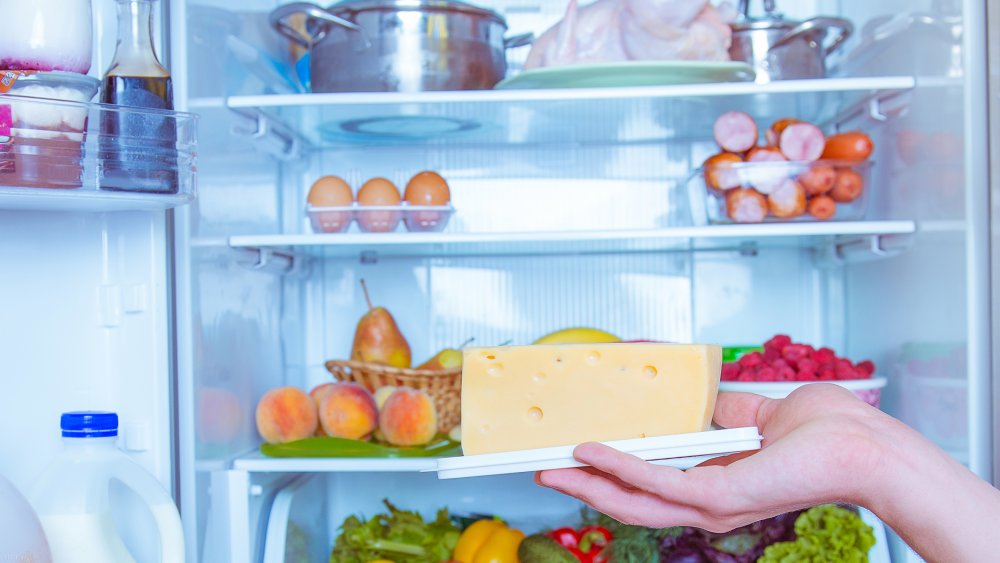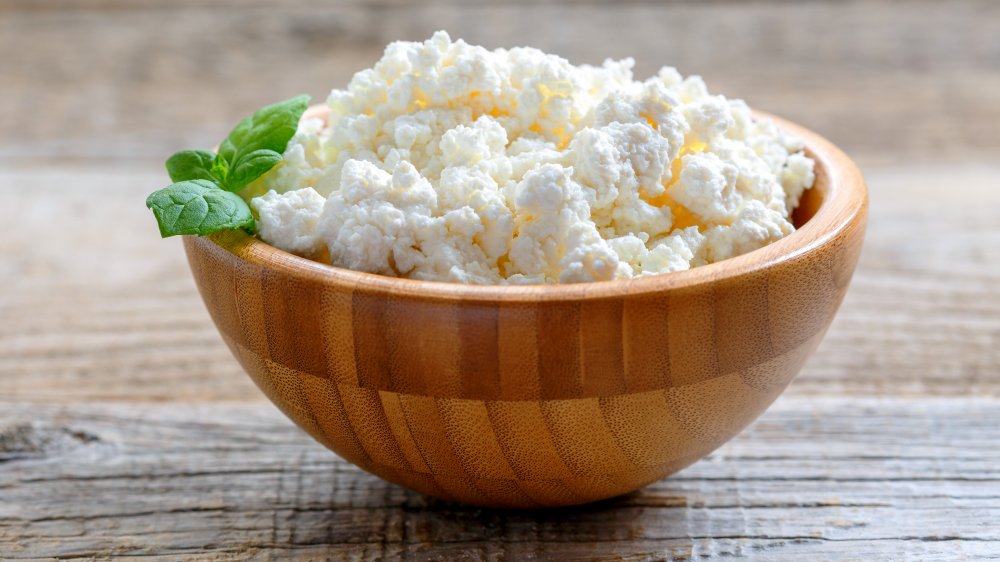You've Been Eating Cheese Wrong This Whole Time
Sorry, grilled cheese fanatics. Any fondu lovers out there? This one's going to hurt. Pizza addicts, beware. This article may not be for you. Turns out, you've been eating cheese wrong this whole time. And the secret to doing it right? It lies in how hot you let it get and how much of it you get. Melting cheese can wreak havoc.
When you melt cheese, you reduce the amount of air in it. This gives you a concentrated dose of fats, sodium, calories, and cholesterol (via Our Everyday Life). Take cheddar, a cheese we love so much that we produced nearly 3.8 billion pounds of it in the United States in 2019 (via Statista). One cup of melted cheddar cheese gives you 983 calories, nearly a full day's worth of cholesterol and sodium, and a whopping seven times the intake of your recommended saturated fat (via Our Everyday Life). One cup of unmelted cheddar gives you, by comparison, 528 calories, half your recommended daily intake of cholesterol, a third of a day's worth of sodium, and only four times your intake of recommended saturated fat (via Fitbit).
Why you shouldn't eat cheese right out of the refrigerator
Cheese plate lovers, if you're breathing a sigh of relief right now, stop. Yes, unmelted cheese may be better for you in a cup-to-cup comparison, but don't serve your cheese plate cold. Again, it's all about the temperature and the fat.
The fat in cheese is what gives it the flavor that you crave after, especially when paired with a refreshing glass of white wine. Fat molecules relax when warmer, releasing flavor and aromas. They contract when colder, keeping that flavor in (and Serious Eats). For maximum flavor, take fresh cheeses out of your refrigerator a half hour before eating, run-of-the-mill cheeses out of your refrigerator at least an hour and a half before eating (via via Culture), and runny cheeses (think brie) two or three hours before eating (via The Kitchn).
If you think that's too much planning to take on, consider simply keeping your cheese outside of the fridge. Most cheeses can be kept outside the fridge safely for days, and firmer cheeses (think parmesan) can last outside the fridge, safely, for weeks (via Business Insider). Pro tip: if you've got to refrigerate your fresh mozzarella because you aren't planning on eating it within the day, soak it in a salted milk bath for an hour before serving.
Is raw cheese the way to go?
Yes, raw cheeses aren't pasteurized, and that means they can potentially carry harmful bacterias like salmonella and listeria, so people with weakened immune systems (the elderly, the young, the pregnant, and transplant patients) should stay away (via the FDA). Consumption of contaminated raw cheeses can, and do, lead to hospitalizations on a yearly basis.
It's worth noting, however, that much of what determines whether or not a cheese represents a health risk is how milk is handled on the way to becoming cheese (via The Counter). While contaminated, pasteurized cheeses don't seem to lead to as many hospitalizations as raw cheeses, they also make people sick on a yearly basis (via Foodborne Pathogens and Disease). Moreover, if you're getting your raw cheese from a reputable farm, you may significantly lower your risks. Take a 2010 study of raw cheeses produced in Vermont, which found "no detectable target pathogens despite the repeat sampling of farms."
Eating raw cheeses may pay off for some people. They're richer in flavor and they contain all sorts of good bacteria and enzymes that are gold to your digestive system, replenishing your gut flora (via Permaculture Research Institute and Cheese Connoisseur). In fact a 2019 study found that consumption of raw milk products is effective at protecting against allergy and asthma development. Just be aware that the FDA warns that raw milk doesn't combat dangerous pathogens on its own and advises sticking to pasteurized milk.


